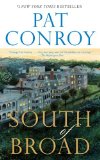Summary | Excerpt | Reading Guide | Reviews | Beyond the Book | Readalikes | Genres & Themes | Author Bio

Prologue
The Mansion on the River
It was my father who called the city the Mansion on the River.
He was talking about Charleston, South Carolina, and he was a native son, peacock proud of a town so pretty it makes your eyes ache with pleasure just to walk down its spellbinding, narrow streets. Charleston was my father's ministry, his hobbyhorse, his quiet obsession, and the great love of his life. His bloodstream lit up my own with a passion for the city that I've never lost nor ever will. I'm Charleston-born, and bred. The city's two rivers, the Ashley and the Cooper, have flooded and shaped all the days of my life on this storied peninsula.
I carry the delicate porcelain beauty of Charleston like the hinged shell of some soft-tissued mollusk. My soul is peninsula-shaped and sun-hardened and river-swollen. The high tides of the city flood my consciousness each day, subject to the whims and harmonies of full moons rising out of the Atlantic. I grow calm when I see the ranks of palmetto trees pulling guard duty on the banks of Colonial Lake or hear the bells of St. Michael's calling cadence in the cicada-filled trees along Meeting Street. Deep in my bones, I knew early that I was one of those incorrigible creatures known as Charlestonians. It comes to me as a surprising form of knowledge that my time in the city is more vocation than gift; it is my destiny, not my choice. I consider it a high privilege to be a native of one of the loveliest American cities, not a high-kicking, glossy, or lipsticked city, not a city with bells on its fingers or brightly painted toenails, but a ruffled, low-slung city, understated and tolerant of nothing mismade or ostentatious. Though Charleston feels a seersuckered, tuxedoed view of itself, it approves of restraint far more than vainglory.
As a boy, in my own backyard I could catch a basket of blue crabs, a string of flounder, a dozen redfish, or a net full of white shrimp. All this I could do in a city enchanting enough to charm cobras out of baskets, one so corniced and filigreed and elaborate that it leaves strangers awed and natives self-satisfied. In its shadows you can find metalwork as delicate as lace and spiral staircases as elaborate as yachts. In the secrecy of its gardens you can discover jasmine and camellias and hundreds of other plants that look embroidered and stolen from the Garden of Eden for the sheer love of richness and the joy of stealing from the gods. In its kitchens, the stoves are lit up in happiness as the lamb is marinating in red wine sauce, vinaigrette is prepared for the salad, crabmeat is anointed with sherry, custards are baked in the oven, and buttermilk biscuits cool on the counter.
Because of its devotional, graceful attraction to food and gardens and architecture, Charleston stands for all the principles that make living well both a civic virtue and a standard. It is a rapturous, defining place to grow up. Everything I reveal to you now will be Charleston-shaped and Charleston-governed, and sometimes even Charleston-ruined. But it is my fault and not the city's that it came close to destroying me. Not everyone responds to beauty in the same way. Though Charleston can do much, it can't always improve on the strangeness of human behavior. But Charleston has a high tolerance for eccentricity and bemusement. There is a tastefulness in its gentility that comes from the knowledge that Charleston is a permanent dimple in the understated skyline, while the rest of us are only visitors.
My father was an immensely gifted science teacher who could make the beach at Sullivan's Island seem like a laboratory created for his own pleasures and devices. He could pick up a starfish, or describe the last excruciating moments of an oyster's life on a flat a hundred yards from where we stood. He made Christmas ornaments out of the braceletlike egg casings of whelks. In my mother's gardens he would show me where the ladybug disguised her eggs beneath the leaves of basil and arugula. In the Congaree Swamp, he discovered a new species of salamander that was named in his honor. There was no butterfly that drifted into our life he could not identify by sight. At night, he would take my brother, Steve, and I out into the boat to the middle of Charleston Harbor and make us memorize the constellations. He treated the stars as though they were love songs written to him by God. With such reverence he would point out Canis Major, the hound of Orion, the Hunter; or Cygnus, the Swan; or Andromeda, the Chained Lady; or Cassiopeia, the Lady in the Chair. My father turned the heavens into a fresh puzzlement of stars: "Ah, look at Jupiter tonight. And red Mars. And isn't Venus fresh on her throne?" A stargazer of the first order, he squealed with pleasure on the moonless nights when the stars winked at him in some mysterious, soul-stirring graffiti of ballet-footed light. He would clap his hands with irresistible joy on a cloudless night when he made every star in the sky a silver dollar in his pocket.
Excerpted from South of Broad by Pat Conroy Copyright © 2009 by Pat Conroy. Excerpted by permission of Nan A. Talese, a division of Random House, Inc. All rights reserved. No part of this excerpt may be reproduced or reprinted without permission in writing from the publisher.
Your guide toexceptional books
BookBrowse seeks out and recommends the best in contemporary fiction and nonfiction—books that not only engage and entertain but also deepen our understanding of ourselves and the world around us.